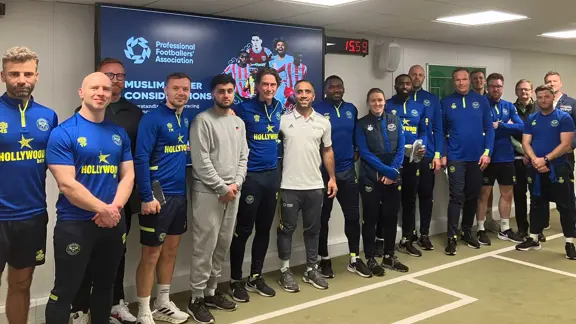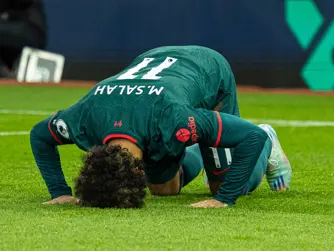News
How the PFA is supporting footballers observing Ramadan in England

- The PFA has been delivering Muslim Player Considerations awareness workshops to clubs in England for over ten years
- Workshops are designed to help coaches and multidisciplinary teams support players year-round as well as during Ramadan in mid-season
- Communication and planning can improve the working conditions for Muslim players within elite environments
With Ramadan falling within England’s domestic football calendar over the next few decades, the Professional Footballers’ Association (PFA) has been delivering Muslim Player Considerations awareness workshops at clubs – designed to help coaches and multidisciplinary teams support players who are fasting during the religious month.
The workshops provide participants with cultural understandings and tangible actions that can improve the working conditions for Muslim players leading into and during the month of Ramadan, such as helping clubs successfully balance nutrition, hydration, recovery and rest.
The last decade especially has seen a rise in Muslim players graduating from academies in England, while the notable impact of Muslim players on the Premier League can be illustrated by three of the last six PFA Men’s Player of the Year winners – Riyad Mahrez, N’Golo Kante and Mohamed Salah – being observers of Islam.
PFA's Muslim Player Considerations Guide

It was in 2013 when Newcastle United had a forward duo of Muslim Senegalese strikers Demba Ba and Papiss Cisse that the PFA’s Player Inclusion Executive, Riz Rehman, recognised the need to educate coaches around Ramadan to ensure they were maximising players’ potential during the religious month.
“Over the years, this work has gone from strength to strength,” said Rehman. “Small marginal gains are often spoken about on the pitch, but quality off-pitch support can be just as crucial when creating a high-performance, inclusive environment which enables players to perform at their best.
“If coaches and support staff know their players’ individual needs, they can ultimately get the best out of them. For Muslim players during Ramadan, this awareness can be particularly important.
“It’s been incredibly rewarding to see how our workshops and support materials have been received during club visits, especially in the build up to Ramadan. Ultimately, we want these sessions to help staff have empathetic, well-informed conversations with players as they approach the period of fasting, which can be physically and mentally demanding.”
Communication is key when it comes to that support. The PFA’s Muslim Player Considerations awareness workshops encourage clubs to sit down with players leading up to the religious month to help build a tailored, individualised schedule that will optimise player performance and wellbeing during that time.
This year, Ramadan is expected to begin on the evening of Sunday 10 March and end on Tuesday 9 April. The first week can be the most challenging for some players as their bodies adjust to new eating and sleeping patterns.
If managed poorly, some of the common side-effects during Ramadan can include tiredness, dehydration, low concentration levels, feeling lethargic and mood swings. It is therefore useful for players to follow a set fasting and training routine.
“For Muslims, fasting during the month of Ramadan is one of the five pillars of Islam. It’s a period of self-reflection, increased religious devotion and self-control over the need to eat and drink between sunrise and sunset. It brings players even closer to their religion and offers them a chance to reflect on those less fortunate,” Rehman explains.
“Sixteen-hour fasts are not easy. However, good support networks and allyship from non-Muslim team-mates and can help fasting players during this period where games come thick and fast.”
The PFA has been visiting clubs across England’s Football League pyramid, from League Two to the Premier League, delivering to support staff and players. Brentford, Rehman’s former club, was one that benefited from sessions which gave guidance on day-to-day assistance for Muslim players, as well how clubs can best support players during Ramadan.
“It was Thomas Frank himself who requested it because he wanted to know more about Ramadan, why the players do it, and how to navigate the month as a head coach,” said Rehman.
“Coaches are sometimes unsure how players at the elite level can fast and perform, but these players have been doing it for a long time. They're used to it and the experienced players will usually self-regulate and start conversations early with their support teams.
“The message is to have conversations with fasting players in advance, plan a schedule and really find out what else can be done to help day-to-day – in terms of player care, the nutritionist, the sports scientist, the psychologist and team-mates.
Following on from the workshop with the first team support staff at Brentford, the PFA organsied for an Imam (Islamic Scholar) to visit the training ground and have one-to-one informal conversations with those players who would be fasting during the training and games programme.
“The Imam visits have been well-received by the players and have given them an opportunity to seek spiritual advice and ask for guidance on some of the Islamic rulings, especially around the exemptions,” said Rehman. “We’ve also been facilitating ‘drop-in’ sessions at clubs, bringing together Muslim scholars, academy players and first teamers to connect, support one another, and share their own individual experiences.

“For Muslim players, their faith is the most important thing – so having that extra wrap-around support and network in place will help to get the best out of them, both in training and matchday.”
While special emphasis is given to the month of Ramadan, the PFA’s Muslim Player Considerations awareness sessions also highlight how football clubs can be doing more to assist Muslim players year-round.
“There are other considerations to make around Halal food, prayer times, facilities, and having policies in place around safeguarding, medical, and recruitment, especially when working with academy players. There are all these little considerations clubs can make with the right planning, and putting the right processes in place will hopefully help clubs to attract and retain Muslim talent to roles both on and off the pitch.”
Rehman continued: “Leading up to the month of Ramadan, there's always a steady stream of content going out about players and their faith across clubs’ social media channels. But that’s just one month of the year. We can value and support players, staff and fans through year-round awareness activities, particularly around highlighting Muslim role models.
“Empowering players to lead on activities aligned to their faith whilst also sharing their cultural identities with their fellow team-mates, helps in creating an open inclusive culture – for all faiths and none.”
